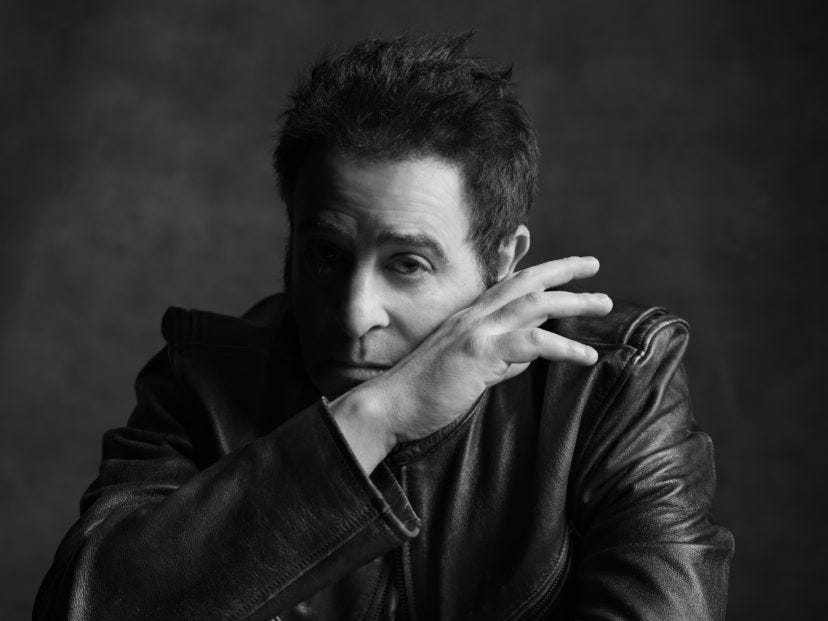Counting Crows: Miracle on 14th St.
Butter Miracle Suite is a triumphant story of finding yourself in new places and bringing that true self into the life you’ve already built
Every once in a while, I can’t reconcile the fact that Adam Duritz of Counting Crows, who is one of the most generous, kind people I’ve ever known, is also one of the best writers out there. I hear so much of my brilliant, compassionate friend in the Butter Miracle Suite— I also hear lines that will echo and resonate in me for the rest of my life. This dichotomy makes it difficult to be objective linguistically: I’m not going to be as good at saying ‘Duritz’ like a professional. Because in this record, I absolutely see a group of artists at the top of their game— but I also hear lines and moments of vulnerability that are absolutely my friends. Forgive me if this doesn’t read like Rolling Stone: I’m going to have to go with “AD” or “Immy.” Perhaps that’s the greatest success of Counting Crows and especially this new EP: the writing is so genuine and real, it’s hard not to feel a personal connection. At least I’m owning up to it.
But Butter Miracle: this is a masterpiece.
As “Tall Grass” slinks into the foreground— because it will become the foreground for you, it is arresting— it immediately breaks into a story. In an unconventional move for an introspective song set “in the shrinking English sky,” the first line is dialogue: “‘Come outside,’ she said to me, as if I knew just what she’d say/ ‘Come outside, we’ll watch tomorrow pull the curtain on today.’” Even in a moment that is about to be startling and abruptly alone, AD hands off the first line of the suite, inviting himself— and us— to that beautiful image of a sunrise. When the song starts in earnest, though, our narrator is alone:
and it takes me through the meadows
and I have got a rifle on my arm
and the rabbit won’t stop shaking
but the life is gone
there is blood upon the clover
and oh God, his eyes are open wide
The stark, blunt contrast of the beautiful scenery and the shaking violence is stunning: there’s the ghost of a T. Bone Burnett production, but it’s chugging forward, even in this first song, towards The Who, Springsteen— toward absolute artistic autonomy. The influences are undeniable (and I’ll talk about the piano and Elton John when we hit “Elevator Boots”), but the voice is clear: this is AD at a human’s most vulnerable and open. The repeating line— “and all along I tell myself I don’t know why”— exposes a moment most of us are never comfortable sharing. A lack of knowledge or understanding is often something we view as a flaw: in “Tall Grass,” it is the reason to keep holding the shuddering rabbit, to understand why there is a moment of shared divinity. (Also, hats off for getting the word “ossify” in a song: are you the first person to pull that off, AD?)
The song grows and morphs and some electronic noise intrudes as the narrator talks through exit strategies— not because he feels trapped, but because leaving is a part of life.
she takes a train to Paris for a weekend with a friend
they take you places, trains in summers
at 200 miles an hour
that you’ve never been
But as stunning as that is— and it is revisited later in the song, where trains can take you to Paris and planes could fly you home— what really stands out is the next line: “Did I ever say/ The way your breath/ Takes mine away?” It is almost a breath-stopping moment: even though the narrator stays behind in the tall grass for a while and explores the entropy and revolution of the world around him as the electric guitar and piano becomes a carousel, speeding up and building to a tornadic crescendo, he is held still in a moment, in a gaze: in a connection. And that’s where I choke up a little: after the music builds, after that declaration, we go back to the rabbit, but in a whole new way:
for the infinite and ageless
for the meaningless and painless
for the times we shook like rabbits, felt like children, made us ask this
can you see me?
can you see me? Can you see me, can you see me, can you see me?
It’s impossible for me to hear that line without thinking of “Have You Seen Me Lately?”— the reference point, where the narrator was once “out on the radio trying to change somewhere out in America”— we now have someone who is not broadcasting, not stateside, and when this voice wants to be seen, it wants to be seen by a witness, by someone whose breath takes his away— not by the world. The question is so much more pointed in “Tall Grass.”
I could likely write a few thousand words more on “Tall Grass” alone, but that’s not what I’m here to do. I’m here to tell you two things: if you have felt disconnected during this pandemic, these four songs are like plugging into a charger. You will be able to reconnect with yourself through the journey. But I also want to tell you— my friend wrote a gorgeous piece of art. I’ve made my name being blunt and honest: I’m bragging. I am so proud for these amazing men for putting together something cohesive, narrative, challenging, beautiful, fun— but also for their willingness to explore what it means when the eyes are open wide but the life is gone.
Has anyone else felt that lately? Have you seen me? Have you seen me? Have you seen me?
The transition to “Elevator Boots” is like someone just passed you some kind of nitrous. It has traits of Elton John (especially with the artistic flair in the chorus) and Billy Joel (AD’s delivery on “and they want to” feels so much like a call to that big, buoyant piano sound). But it is catchy, it is clever, it is addictive— it’s not our narrator. “Elevator Boots” is about someone the narrator will later watch from the audience— Bobby from Bobby and the Rat Kings. But it would be bad form for me not to show you how good some of these lyrics are (and I think I’m including a delightful lyric video as well)— this is how we get to meet Bobby.
bobby was a kid from round the town
kicks pumped up and head held down
underwater more than he was up
he dreamed of submarines in bottle green
imaginary flight machines
but in blue jean flares he bubbled like a 7-Up
The song is full of delightful lyrical moments: “I met Alice near the Alamo/ one summer in San Antonio/ I remember her, I don’t remember me” already lives in my bones. I have a strange relationship with memory since my stroke, and there are certainly times where due to that, I’m not the protagonist in my own story— hearing it phrased so well made my feeling of disconnection feel, well, connected. I’m not alone. Me and Bobby, right? Or me and everyone? We’re all doing this. Thank God AD knew how to say it. For Bobby, playing music and taking “a ride on the radio dial” is his core— but it’s getting harder for him to know what to do when he’s not onstage. Admittedly, he says, “And I don’t always understand how to smile.”
This is the turning point for me. I’m going to go ahead and call it. When “Elevator Boots” slid into “Angel of 14th Street” the first time, I almost sobbed. “Elevator Boots” is so alive and full of energy, so to have the next song feel like a train exploding out of the station— perhaps at 200 miles an hour, thanks in no small part to Jim’s explosive percussion— is stunning. You might have another favorite on the record, and that’s fine! It’s OK to be wrong. (I’m kidding, I basically have a four-way tie for favorite… but this one pulls in front pretty often
Here is where the natural turns supernatural: the ghosts have made a ghost of the angel. She is learning to live with the things she is unsure of. But the music is pure alchemy: in the breakdown, the guitar line seems to echo “did he leave a light on?” And the brass seems to respond in a round: “Do we need the light on?”
That’s part of the magic, you know. This song I would almost have to write line by line to explain the way it seems to weave threads between “Tall Grass” and “Elevator Boots,” but my God, the musicality is so stunning that when the brass comes in on “Angel Of 14th Street,” it’s hard not to cry, but it feels triumphant, tears that reclaim humanity. When AD sings, “paint your face black and blue/ and wake up, wake up, wake up/ wake up new/ put on clothes that make you feel like you’re not broken,” I look at the rock shirts I’ve collected and adored since my stroke, the things that surround me and make me feel like I can be someone I recognize: I feel like this song is the light on, for me. For all of us.
But then my whole body is electric with, “if God is dead, why am I here?/ Did He leave a light on for me..?” To fade from that to the Springsteen-esque “Bobby and the Rat Kings” is a hell of a transition: the internal rhyme scheme and rhythm is so impressive that when the song slows to a bridge, it almost feels like going on a slow, beautiful walk with a friend.
“Bobby and the Rat Kings.” Wow. It is such a tour-de-force that it’s hard to know where to start. But from the first line— the almost pleading tone in AD’a voice when he says, “I’m an elevator kid pressing buttons when I want to go home”— we have such a strong tone and image. Until Bobby and the Rat Kings play, this song is a rollercoaster: the internal rhyme, the playfulness, the imagery. It’s an auditory and sensory delight (I also love that the next line is “my ge-generation hadn’t even got a name of its own”: the subtle Who reference rules, and, to be very selfish, means a lot to me personally: the first time I had the pleasure of seeing Counting Crows was when they opened for The Who in 2002.
This song definitely pays homage to the greats: The Kinks, Springsteen, Big Star, Teenage Fanclub, The Who— just Good Solid Rock. It just FEELS right. (It’s hard not to hear some “Born to Run” in the slowed bridge— but thanks to the clever piano, there is a slight hat-tip to Billy Joel’s “Miami 2017.”) But how could you do anything but enjoy a song about a person deciding yes, the woman, Z the Cat— she’s right. “Memories are all that we’ve got.” But her next offer is to make some that night at the show. Our narrator has found a way to integrate his wide-eyes, his ghosts, the parts that feel broken, and accept love despite those things.
It’s also fun as hell. Seriously, check out AD’s radical and intense metrics (sorry students, I just can’t turn that part of me off)—
Z tried to edit Reddit but instead said it had eaten her phone
she goes from Tinder to Cinder til she remembers she’s a flame of her own
you can almost lose your heart, hoping for something better
til the days get longer and the nights won’t start
So our narrator does it. He embraces the moment. Makes a memory. Lets art wash over him and fill the cracks and anxiety with electric gold, aural kintsugi— at least while the band plays. And that’s really what it is, right? Going from moment of meaningful contact to moment of meaningful contact, evaluating ourselves through lenses of fear in every moment in between. When our narrator finds happiness, it seems to ignite something new and vivid in Bobby, too: coming out of the broken down bridge, the guitar picks up anxiously, which it should with lines like, “so there’s some leather-wrapped, Fender-strapped kid with a pick finger twitch.”
This record is living proof that the Lovin’ Spoonful was right— I believe in magic, how music can free me whenever it starts—
I am writing this because this record is so good I want to tell you about the music that will free your soul— I am telling you, the Internet void, about rock and roll.
Bottom line? My friend made a really brilliant record. A band— you know them, they’re Counting Crows— made a piece of art that finds a way from the shuddering of our own mortality to the thrumming of connection. I am in love with this record. Congratulations on something that feels like a tuning fork: pulsing, real, vulnerable, and still climbing and reaching for joy.
And I’m sorry but I’m totally posting a dorky selfie from the last Festival. Miss you AD.







